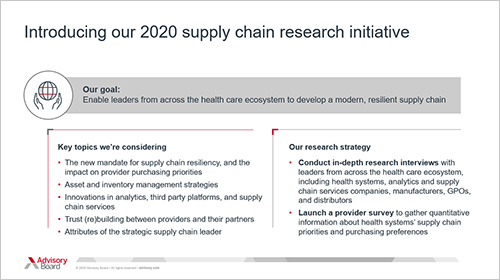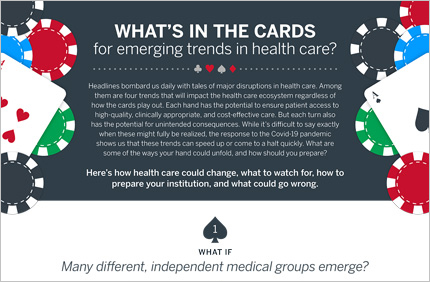Auto logout in seconds.
Continue LogoutThe unpredictable waves of Covid-19 cases have exposed major vulnerabilities in our health care supply chain—not just in terms of PPE shortages, but also in terms of diagnostic test turnaround times, sustainable access to critical medicines, and inscrutable allocation models. While increased domestic production and local stockpiles of essential medical supplies are important strategic responses, they will not adequately mitigate risk of future shortages—or help us bend health care’s cost curve—until the entire ecosystem commits to five fundamental supply chain imperatives:
- Strategic supply chain leadership
- Adaptive demand planning
- Integrated inventory management
- Radical cross-sector transparency
- Friction-free collaboration models
These imperatives emerged from a survey of more than 70 health system executives and conversations with more than 20 leaders across the supply chain. The data and insights from this research can help suppliers and distributors evolve their strategies to better meet the needs of health system customers. Our ongoing research in this area aims to illuminate:
- How providers balance the need to purchase more critical supplies with their need to reduce cost
- How evolving supply chain requirements are likely to impact provider-supplier partnerships
- How health system executives are thinking about investments in improved data visibility and analytics
- Which characteristics providers value most as they consider new supplier and distributor partners
Download our survey one-pager: Health system supply chain and purchasing survey snapshot
On this page, download helpful resources and share lessons learned with your team for ways to partner with purchasers in order to build a more modern and resilient supply chain.
Each year, our research experts are invited to speak at industry conferences across the country. Brandi Greenberg shared our supply chain research at events this fall.
Download these presentations to get a glimpse into the types of research our team produces. Fill out the form to connect with our experts and learn more.
- [Excerpt] The New Health System Supply Chain Mandate
- Sneak peek into Advisory Board’s latest survey of health system purchasing executives
Download this infographic to explore four emerging trends that are likely to impact health care delivery—and get an understanding of what health care could look like in 2030 if each trend continues.
About Advisory Board
For more than 40 years, we've helped executives and future leaders in health care work smarter and faster by providing provocative insights, actionable strategies, and practical tools to support execution.
With 40+ years of experience, a team of 250+ experts, and a network of 4,900+ member organizations that span the payer, provider, and supplier industries, we support life sciences firms’ commercial and medical leaders with research and educational resources that develop market strategy, enrich customer insight, and more.
More for life sciences medical leaders
Don't miss out on the latest Advisory Board insights
Create your free account to access 1 resource, including the latest research and webinars.
Want access without creating an account?
You have 1 free members-only resource remaining this month.
1 free members-only resources remaining
1 free members-only resources remaining
You've reached your limit of free insights
Become a member to access all of Advisory Board's resources, events, and experts
Never miss out on the latest innovative health care content tailored to you.
Benefits include:
You've reached your limit of free insights
Become a member to access all of Advisory Board's resources, events, and experts
Never miss out on the latest innovative health care content tailored to you.
Benefits include:
This content is available through your Curated Research partnership with Advisory Board. Click on ‘view this resource’ to read the full piece
Email ask@advisory.com to learn more
Click on ‘Become a Member’ to learn about the benefits of a Full-Access partnership with Advisory Board
Never miss out on the latest innovative health care content tailored to you.
Benefits Include:
This is for members only. Learn more.
Click on ‘Become a Member’ to learn about the benefits of a Full-Access partnership with Advisory Board
Never miss out on the latest innovative health care content tailored to you.


